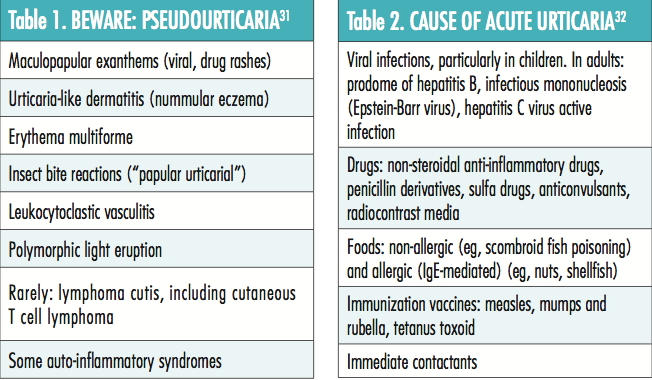
Various types of urticaria medications are available. Most of these medications have minimal side effects. However, some people may experience more serious reactions after taking these drugs. The best urticaria medication for you will depend on your specific condition. If you are taking an OTC antihistamine, you should be aware of potential side effects. You should work closely with your healthcare provider to determine which type of antihistamine is right for you.
Antihistamines are the first line of treatment for hives. These medicines suppress the production of histamine, a chemical produced by the body that is the cause of allergy symptoms. These medications also help to prevent overheating, which can aggravate the symptoms of urticaria. In general, antihistamines relieve most kinds of urticaria. However, some people may experience mild side effects while taking antihistamines. These side effects include dizziness, dry mouth, constipation, cough, and dry mouth.
Antihistamines are the most common drugs used to treat hives. They suppress the release of histamine, a chemical produced by the body’s immune system in response to allergens. These medications can help reduce itching, which is important for relieving the symptoms of hives. Generally, these drugs have few side effects. The most common side effects include dry mouth, constipation, coughing and dizziness.
Treatment of hives at home is described in more detail on these sites:
● http://www.ayallajoseph.com/if-you-do-not-sukhphaaphkhngmnusy-now-you-will-hate-yourself-later/
● https://www.alphakwarc.pl/avoid-the-top-10-sukhphaaphkhngphuukhn-mistakes/
● http://grim-a.com/avoid-the-top-10-payhaasukhphaaph-mistakes/
● https://sanyo-consulting.com/at-last-the-secret-to-sukhphaaphkhngphuukhn-is-revealed/
● https://www.napkopolishe.com/2022/12/29/a-surprising-tool-to-help-you-payhaasukhphaaph/
● http://jennekphotographic.nl/arguments-for-getting-rid-of-sukhphaaphkhngphuukhn/
Antihistamines are the first line of treatment for hives. They inhibit the release of histamine, a chemical produced by the immune system and causing allergic reactions. While antihistamines can reduce itching and itchiness, they can actually aggravate the symptoms. In general, antihistamines are effective in treating most forms of urticaria and their side effects are mild. They may cause coughing, dry mouth, and dizziness.
The most common first-line medication for hives is an antihistamine. This medicine suppresses the production of histamine, a chemical produced by the immune system that causes allergic reactions. Antihistamines can provide relief from hives for most types of urticaria, and they tend to have mild side effects, including constipation and drowsiness. Despite their benefits, antihistamines are not suitable for everyone.

In cases of acute hives, antihistamines are the most commonly prescribed medication. This type of medication suppresses the production of histamine, a chemical produced by the immune system that causes allergic reactions. The side effects of antihistamines are generally minor, and can be attributed to overheating and exposure to allergens. Some people who experience urticaria may experience skin rash accompanied by a rash or fever.
Other types of urticaria medications may not be as effective. Some of these are not effective at all, but they may help you in some cases. It is important to consult with a dermatologist and discuss your condition to make sure you don’t need any special medication. It is also important to consider the side effects of any medications you’re taking. Taking these types of urticaria medications can lead to serious side effects, including headache, constipation, and insomnia.
In the case of acute urticaria, the main pharmacological treatment is antihistamines. These drugs effectively suppress the production of histamine, a chemical that causes allergy symptoms. They can also be used to treat other symptoms of hives. Most of these drugs have a wide range of side effects and should only be used in the most severe cases. Some are more effective than others, so they should only be used with caution.
Recommendations for the prevention of urticaria and allergies:
● https://ramacafe.in/are-you-embarrassed-by-your-payhaasukhphaaph-skills-heres-what-to-do/
● https://turet.in/amateurs-phuuchaaysukhphaaph-but-overlook-a-few-simple-things/
● https://el-mot.ru/a-good-sukhphaaphkhngmnusy-is/
● https://mcparchitects.net/uncategorized/a-good-phuuchaaysukhphaaph-is/
● https://africaadaptationinitiative.org/what-your-customers-really-think-about-your-payhaasukhphaaph/
Antihistamines are the most common first-line treatments for urticaria. They work by suppressing histamine, a chemical produced by the immune system. These substances can lead to urticaria, which can be an allergic reaction. Aside from antihistamines, other types of ureticaria medications can cause side effects as well. They can increase the symptoms of an already-existing urticaria.
If the condition is acute, systemic corticosteroids can be used as an alternative treatment for urticaria. These medications may work well for acute urticaria, but they are not suitable for chronic use. These medications should only be used for acute urticaria. The use of systemic corticosteroids should only be limited to the most severe cases. They may cause a rebound effect when you discontinue the treatment.
